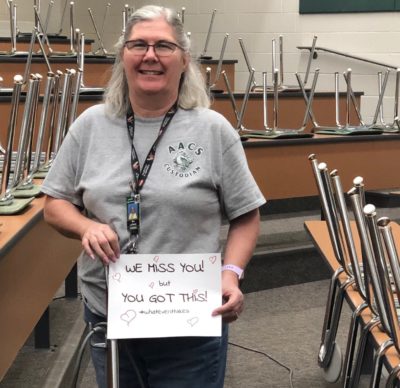Juan Ramos has been a school custodian and union member for nearly 30 years. His father was a custodian before him, and Ramos spent summers helping his dad starting out when he was just fourteen-year-old. With that much experience under his utility belt, Ramos definitely has the know-how to protect students and educators from coronavirus, but only if he and his colleagues have the equipment and staff-power necessary to fight the deadly virus.
“Custodians are on the front line of defense at school,” says Ramos, who works at Maple Brook Elementary School in Naperville, Illinois. “We need to make sure our schools are thoroughly cleaned and disinfected throughout the day, after the students leave, and before they come each morning -- now more than ever in history.”
It’s not just hand sanitizer, hand washing and social distance that will keep schools safe, he says, but sophisticated cleaning equipment designed to take on the deadly virus.
“Custodians will need electrostatic sprayers to make sure that we hit high touch surfaces with the right chemicals for fighting the virus, we need hospital grade, which is the best there is,” Ramos says.
The sprayers should use a solution that is EPA registered for use against the cause of COVID-19 and should be applied to all touch and hard surfaces, door handles, furniture, floors – everything. The solution takes about 10 minutes to activate so it can’t be rushed and will need to be used in hallways, bathrooms and classrooms throughout the day, which will take extra hands than the current staffing level of one or two daytime custodians and one evening custodian.
They also need N95 masks to protect themselves. “Custodians, nurses, bus drivers – we all deal with sick children, we always have,” he says. “There’s always a body spill, and when children get sick, we have to go in there and disinfect and clean, as do bus drivers if it happens on their bus. Our nurses have sick children in their offices each day. We need the best masks and gloves to keep us healthy so we can keep working to keep the school healthy.”
To make schools safe enough to reopen for our children, it’s critical that we pass the HEROES Act in the Senate, Ramos says.
State and local governments are facing huge shortfalls as a result of the coronavirus, losses not seen since the Great Depression. As a result, public schools will be dealing with tremendous financial challenges just as they need more funding to increase safety measures. Educators, parents and public school advocates are urging Congress to prioritize dedicated funding to support public school students, educators, and communities in the next coronavirus relief package, not just billionaires and corporations. The House passed the $3 trillion HEROES Act. Now, the Senate must act.
NEA is advocating for the COVID-19 package to include at least $56 million for personal protective equipment (PPE) like N95 masks for education support professionals (ESP) and teachers in direct contact with students every day. They are frontline, essential workers, and that means they need PPE to protect themselves, their families and their communities and the students they serve.
Email your elected officials and tell them educators need PPE!
Beyond having the necessary equipment, Ramos says that as he opens the door at school, staff will need to make sure children and staff don’t have a temperature and don’t feel sick. They’ll need to make use of the hand sanitizers set up throughout the school, and they’re going to need to remember their personal hygiene manners.
“That means we’ll all have to really, really wash our hands, respect each other when sneezing and coughing,” Ramos says. “There will be new rules, new procedures, it’s a new era. But with the funding we need for the safety equipment we need, we’re going to get through this. We’re ESPs, that’s what we do.”
A Custodial Checklist
 School custodian Tammy LaPlante
School custodian Tammy LaPlante
Tammy LaPlante, a high school custodian in Ashtabula, Ohio, offers a checklist of safety and cleanliness precautions as schools reopen.
- Training for custodians regarding the proper procedures for cleaning and disinfecting, especially if they will be using a disinfecting machine.
- Adequate supply of PPE as it requires changing your gloves and other PPE when moving from one task to another.
- Sanitizing stations at all the entrances being used so upon entering the buildings hands can be sanitized.
- Timetable for cleaning and disinfecting at regular intervals throughout the day and for the night custodians.
- All touchable areas need wiped down and disinfected to include restrooms, hallways, handrails, elevators, light switches, door handles and push bars, as well as nightly mopping of all floors.
- Doors should be left open for minimal risk of contamination.
- Discontinue use of drinking fountains if possible, but if they are used then more regular disinfecting needs to take place.
- Check CDC guidance on reopening.
NEA is currently working with partners and affiliates to develop guidance on schools reopening.







